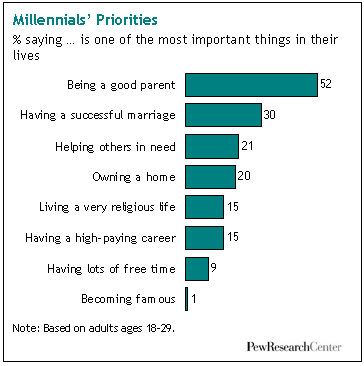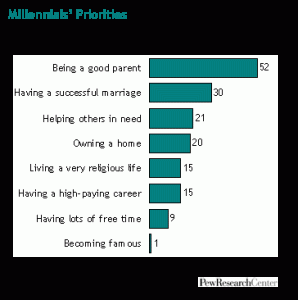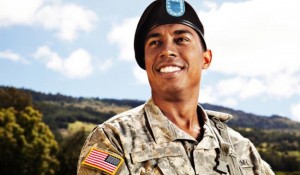
Veterans are fierce, persistent against all odds, and amazing leaders. Sure, not all veterans are the same, but a majority of vets are exceptional with whatever they pour their energy into, whether it’s fixing diesel engines or running a Fortune 100 company. A vision for the future of the Division of Veterans Affairs has to be equally bold. When I think “bold,” I think of Bobby Kennedy’s powerful declaration:
“There are those who look at things the way they are, and ask why… I dream of things that never were, and ask why not?”
‘Why not?’ is like a mental palate cleanser, one that will suit us well. I’d invite you, for a moment, to forget everything you think you know about how things work in state government and even what you may believe about veterans – and let’s start with a clean slate.
- This is the 2nd part of a three-part series on veteran’s affairs in RI.
First, let’s think about the people of the RI Division of Veterans Affairs, or the VetAffairs team as I’ll call them. The division has to be a lean team with some of the most dynamic, engaging, and creative Rhode Islanders around. They’d be beyond committed to veterans and their families and have a deep appreciation for everyone in the National Guard, Reserves, and Active Duty force who live in our state. You’d hear their enthusiasm and commitment in the tone of their voice, a warmth and sincerity as they talk about why they joined the VetAffairs team.
The organization would become agile, responsive, and super connected to every town and city in the state. If you’re a veteran, you’d know someone on the team or at least follow them on Twitter (yes, I said Twitter, @RIVeterans does exist). Above all else, the team would be facilitators, connectors, and community builders.
Second, services provided by the division need to match the pressing issues of our time. The Division can no longer be a resource hub; it must become a platform for human capital development. Its core competency will be taking the unique assets each veteran brings back to the state and leveraging this talent in the local economy to foster small businesses, cutting edge research, and new jobs. The veterans will do the heavy lifting, while the VetAffairs team will empower them by accelerating their transition to civilian life (see Part Three in the series, next week!).
The RI Department of Labor & Training and local non-profits in the state must realize a real-time, fluid collaboration with the VetAffairs team to synchronize veteran’s aspirations with mentors, leaders in business, technology, education, and healthcare. Veterans who graduate from Rhode Island universities will stay here, infusing local industry with a powerful combination of millennial entrepreneurship and veteran tenacity.
Embracing Rhode Island’s size, each one of the 72,000+ veterans of our state have to be brought to the table, to become solution designers and collaborators. Our focus is sometimes so strained on those who need assistance, the homeless or unemployed veteran, that we forget there are tens of thousands of veterans who are doing well in our state. For every veteran who is homeless in Rhode Island, there are 266 veterans with a place to call home. And for every veteran who’s unemployed, there are 16 that have a job. We need a charismatic team of expert communicators who can inspire a powerful veteran network of connectors and mentors. But why stop there? The success of a veteran’s transition can be multiplied by the success of the community around them. Remember the other 93.4% of Rhode Islanders who aren’t veterans. That’s a lot of personal and professional capital to jumpstart educational dreams, seed funding for startups, and long-term career planning for every vet who comes home to the Ocean State.
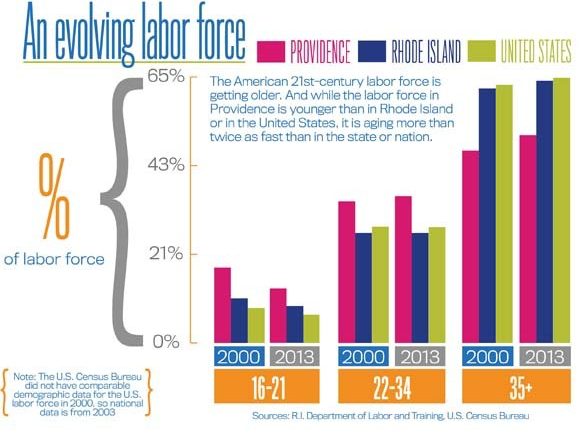
Why should we be so focused on accelerating a veterans’ transition from active duty? Over the next decade, millennials (post 9/11 veterans) will become 75 percent of the total workforce. Our success in harnessing their talent and leadership will directly impact the growth and health of our state’s economy as well as the long-term welfare of our veterans and their families. It’s also the quintessential preventive measure, nipping in the bud the negative consequences of a poor transition– negating many of the problems that typically consume media attention around veterans: strained mental health, unemployment, homelessness, etc. The Division of Veterans Affairs has the most crucial role to play in this preventative strategy, one that sets our veterans up for success and saves us all the costs of inaction or poor execution.
While there ought to be vigorous engagement with new veterans, older veterans are making a different, but hugely important transition too: retirement. Having worked as a psychologist with many veterans crossing this bridge, the significance and challenges of retirement cannot be underestimated. Most of these veterans can expect a complete reconfiguration of their lives, their identities, and changing health needs. Our primary responsibility to these veterans is assuring that those who are eligible and wish to receive their healthcare from the Providence VA Medical Center, get it reasonably quickly. The Providence VA has some of the most dedicated clinicians providing the highest quality care. The VetAffairs team must support a seamless enrollment process so vets can get that fantastic care. It starts by maintaining a strong, active collaboration with those who deliver healthcare to our veterans (Dr. MacKenzie, the Medical Center Director, and her entire staff).
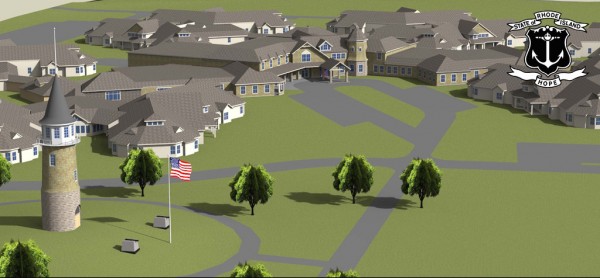 Lastly, by 2017, the division will have an amazing home to offer nearly 200 older veterans. The new and improved Rhode Island Veterans Home promises to be one of the best assisted-living facilities for veterans in the nation. Yet, we need to go beyond offering veterans a state of the art residence. We need to offer the Rhode Island community a new cultural center.
Lastly, by 2017, the division will have an amazing home to offer nearly 200 older veterans. The new and improved Rhode Island Veterans Home promises to be one of the best assisted-living facilities for veterans in the nation. Yet, we need to go beyond offering veterans a state of the art residence. We need to offer the Rhode Island community a new cultural center.
I grew up on Roosevelt Drive in Bristol, a street that runs beside the Veterans Home. And even so, when I think of ‘veterans’ I don’t picture the Veterans Home. Instead, I think of the vets marching in formation or sitting on the back of slick, classic corvettes during the Bristol 4th of July Parade. After investing $94 million into the home’s revitalization, part of it should be a gathering place where our state’s rich military history is not only told with engraved stones and markers, but by the people who actually lived it. Let’s create a convening space where our World War II, Korea, and Vietnam veterans are invited to share their stories and maintain a vibrant connection to the life of the Bristol community and broader state. Let’s showcase our deep naval roots and sea faring heritage. Let’s not, as a WWII resident at the Veterans Home recently cautioned, lose all of that history.
Some will read this article and think it unrealistic. There’s plenty of cynicism to go around these days, especially about what government can do – and the Division of Veterans Affairs is part of state government. But I’ve never bought into the cynicism. If there is any part of government that has the potential to deserve your trust and confidence, it is the VetAffairs team – comprised of veterans empowering veterans, a rock solid recipe for efficiency, accountability, and tremendous social impact. Rhode Island is positioned to lead the nation in fast tracking its veterans’ success. Let’s get it done.
This is part two of a three part series.
Next week we will explore some little known challenges that the state will face implementing this plan, and how to overcome them.


